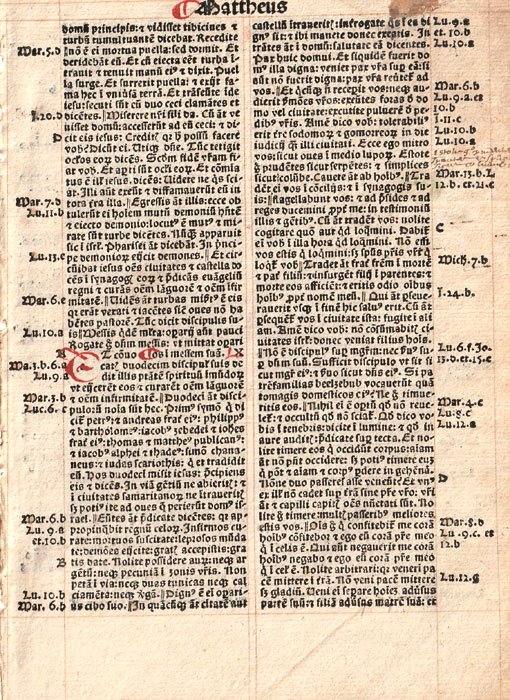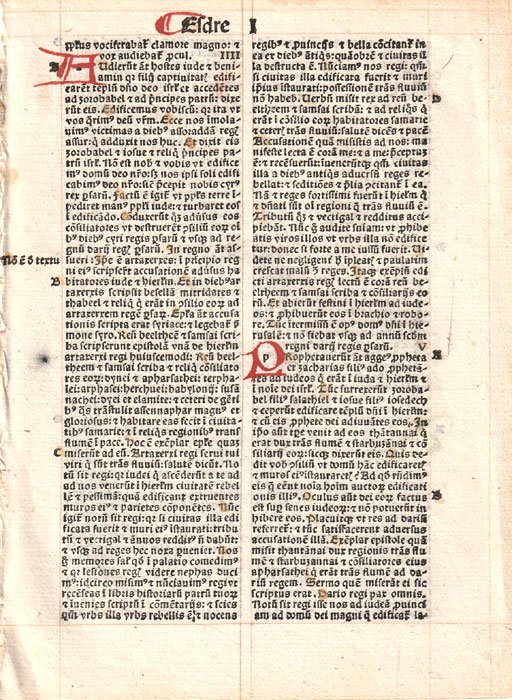Before 1500 the cost of paper far exceeded any other expenses incurred by printers and publishers when issuing a new book. The larger the book, the more expensive it was. A folio Bible such as the one printed by Gutenberg in the early 1450s was unaffordable to all but a few. A less expensive option was needed and this need was fulfilled in the Poor Man’s Bible

Johann Froben, a Swiss printer, printed the first pocket-sized octavo Latin Bible at Basel in 1491, the so-called “Poor man’s Bible.” He completed the second edition in this small format in 1495. Convenient to carry and easily affordable, this edition combined several user-friendly features that Froben advertised on his title page: marginal chapter divisions and references, a subject index, and tabular summary of the books and their contents.

Prior to the publication of Froben’s 1491 Biblia integra, printed Bibles tended to be massive folios that were difficult to transport, making them talismanic objects as mush as texts, and therefore primarily suited for ecclesiastical use. Because of its relatively diminutive size Froben’s Bible became known as the original “Poor Man’s Bible “, eminently transportable and therefore eminently accessible . Although Froben’s Biblia integra was printed in Latin, because of its small size, it should rightly be ranked with Martin Luther’s 1534 German Bible, and later sixteenth and seventeenth century Bibles translated in to other vernacural European languages, that made the Bible increasingly accessible to laypeople in early modern Europe.
The “Poor Man’s Bible’s” nickname came from the small format – median octavo (6 3/16 x 4 5/16 inches; 157×110 mm). Despite the relatively small size, the Bible exhibits the best craftsmanship of its time. Triple-filleted boards and foliate borders; floral ornaments; deer and griffin stamps; manuscript three-line capitals in red and blue; contemporary blind-tooled pigskin over reverse beveled wooden boards; brass catches and clasp fasteners; blue stained edges and so forth. It was printed in a new architectural design “rotunda,” that allowed Froben to produce printed pages of great clarity and neatness despite its small size.

“The “Poor Man’s Bible” today is quite scarce. The last known first edition appeared at an auction was on December 15, 1986, during an event held at Sotheby’s. Current pricing for the only first edition available for sale is $26,200. The second edition which was printed four years later on Oct. 27, 1495 and is equally scarce, is also selling for around $25,000. Not bad for a small octavo that was intended to appeal to the common church goers and ultimately be called “The poor man’s Bible. “” – article from Rare Books Digest.

Johann Froben was a noted book printer in Basel. He was a close associate of Desiderius Erasmus, whose works he published and who, for a time, was a guest at his home. Hans Holbein the Younger met Erasmus through Froben, for whom he designed many book illustrations. Froben established the greatest Swiss publishing firm of the early sixteenth century. The house continued under the direction of his heirs and associates until 1587. A scholar himself, a master printer, and a successful businessman, he recognized the vitality of humanistic thinking. Before moving to Basel in 1490, Froben had worked as a printer in Nuremberg with Anton Koberger, the godfather of Albrecht Dürer. Three years later, he entered a partnership with Johannes Petri and the leading Basel printer of the preceding generation, Johannes Amerbach. After the death of his partners, Froben took full control of the press. In 1500 he married the daughter of the bookseller Wolfgang Lachner, who entered into a partnership with him. She ran the commercial side of the business, while Froben handled the authors and editors and the process of production. By 1510 his press had become the centre of a large circle of mostly German and Swiss humanist scholars.
Currently we have two leaves for sale from the Poor Man’s Bible. One from the book of Ezra and one from the book of Matthew.

